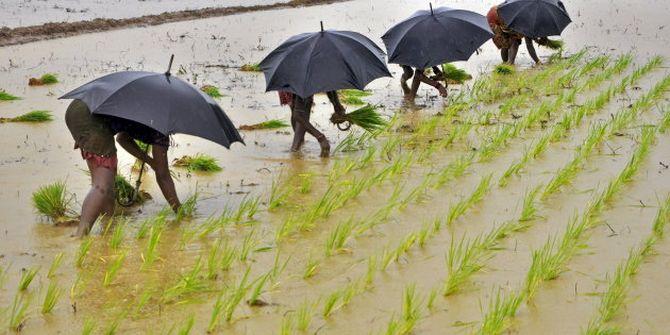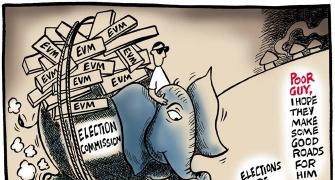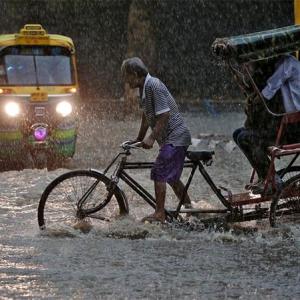Monsoons have had limited effect on market returns for a given year, report Sachin Mampatta and Sundar Sethuraman.

The India Meteorological Department has predicted rains at 96 per cent of the long period average.
Markets have seldom moved in line with rainfall, shows an analysis of past years' data.
For example, above normal rainfall in 2011 (98 per cent of long-period average predicted, actual was 102 per cent) coincided with a 24.6 per cent calendar year decline in the S&P BSE Sensex.
A shortfall in rains in 2014 (95 per cent predicted, actual was 88 per cent) coincided with a 29.9 per cent gain in the index.
The correlation between the India Meteorological Department's April predictions and calendar year returns on market barometer S&P BSE Sensex is -0.34, suggesting that monsoons have had limited effect on market returns for a given year.
A value of one would indicate perfect positive correlation, which would mean that the two values move perfectly in sync.
A value of -1 would indicate perfect negative correlation.
This would mean that one value increases whenever the other decreases.
A value of zero suggests that the two don't move together at all.
Private weather forecaster Skymet Weather Services said on April 3 that rains are expected to be below normal, at 93 per cent of the long period average.
The spatial distribution of the rainfall matters more than the actual amount of rainfall received, according to Abhimanyu Sofat, Head of Research, IIFL Securities.
Too much rain in one part of the country and too little elsewhere, can be a negative.
That said, work on irrigation projects over the last decade have left the country in a better place to deal with such issues than before, and there is sufficient buffer stock of essential grains to tide over any issues that may arise, according to him.
"India has adequate amount of food reserves to take care of any challenges that may arise over the next few months," he said.
While food may not be a problem, there are fears over rainfall's impact on economic activity.
Much of India is still engaged in agriculture, especially in rural areas.
Sachin Shah, Fund Manager at Emkay Global Financial Services said that quite a few states are already facing water issues which can have an impact on consumption going forward.
"If monsoons are not good, then it can have a decent amount of impact on rural demand and on aggregate demand in the economy," he said.
Business Standard examined data over the last 15 years.
The India Meteorological Department's predictions have an error margin of five per cent.
They had predicted that rainfall would be within 97 per cent of the long term average in April 2018.
The actual rainfall came in at 91 per cent.
The S&P BSE Sensex gave returns of 5.91 per cent during the calendar year.
Siddhartha Rastogi, Managing Director at Ambit Asset Management also said that poor monsoons could affect growth in a post-election quarter.
"The spending by the government is usually higher during the election year in the form of doles and infrastructure projects to keep the electorate happy. However, once the polls are over there is no such urgency. A poor monsoon could further aggravate the crisis and dampen growth," he said.
Markets are unaffected by poor rains.

Source: India Meteorological Department, Press Information Bureau, Lok Sabha question, Skymet Weather Services
Note: 2019 figure is for Skymet. Prediction is with model error of ± 5%










